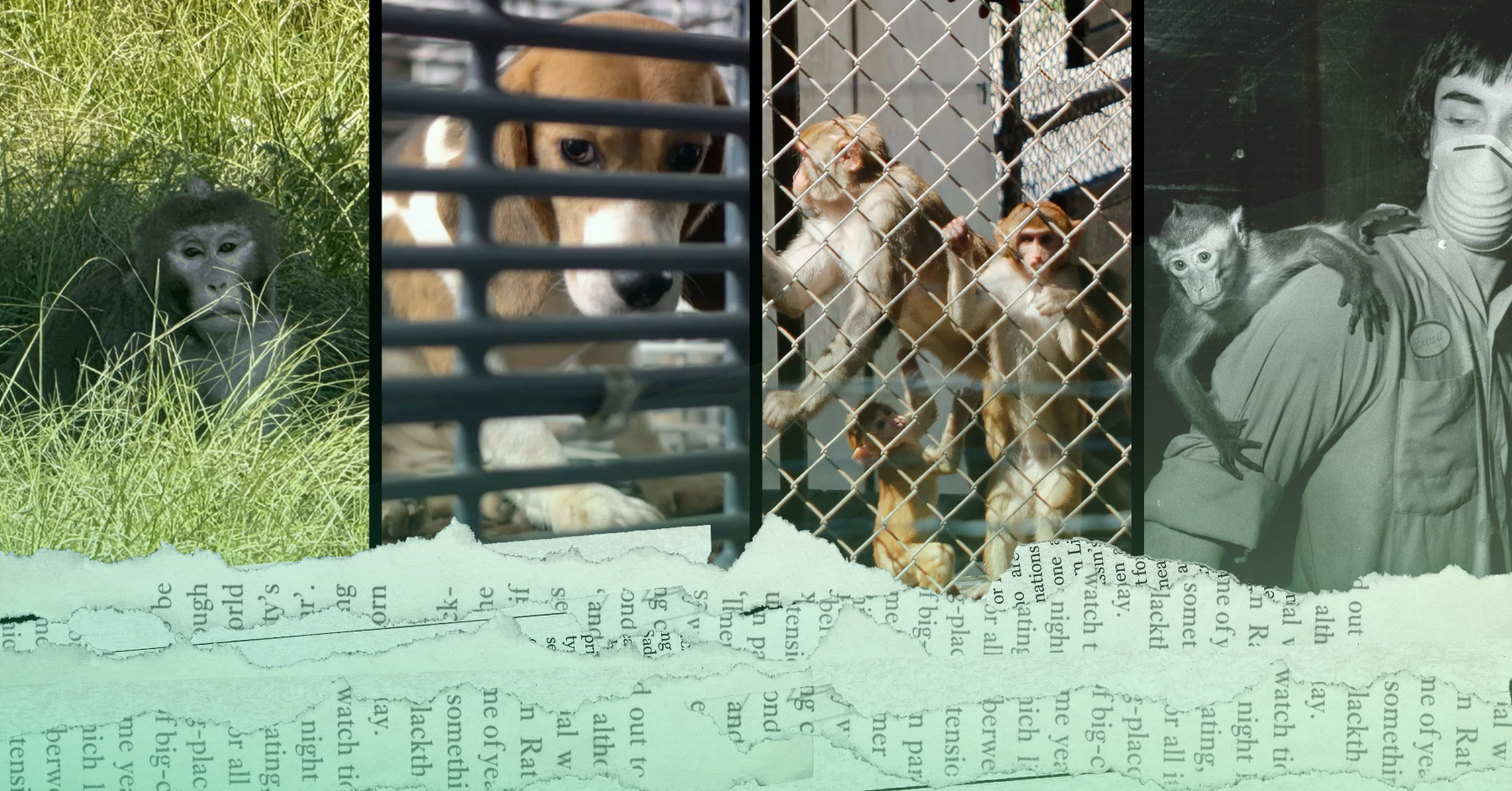
Here’s a roundup of the week’s biggest news stories related to animal research — all the recent media coverage you need to know right now to be the most effective activist for animals in labs.
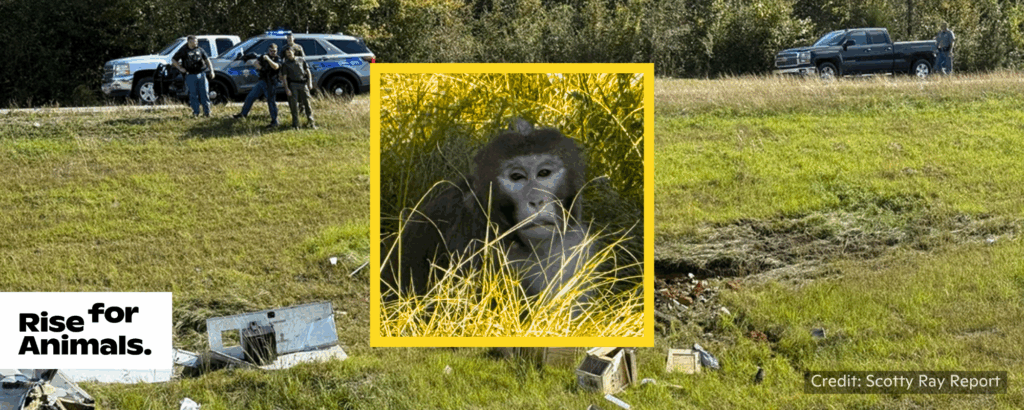 Monkeys Headed for Lab Hunted with Assault Rifles, Killed
Monkeys Headed for Lab Hunted with Assault Rifles, Killed
Rise for Animals, 11/5/2025
Last week, a truck said to be carrying 21 rhesus macaques—boxed in wooden crates and shipped like cargo—flipped on a Mississippi freeway.
The crash turned several of these crates into “crumbled and strewn about” splinters. From the debris, several small (estimated 12-40 pound) prisoners managed to do what their captors feared most: break free.
But most didn’t get far. 📰 Full Story →
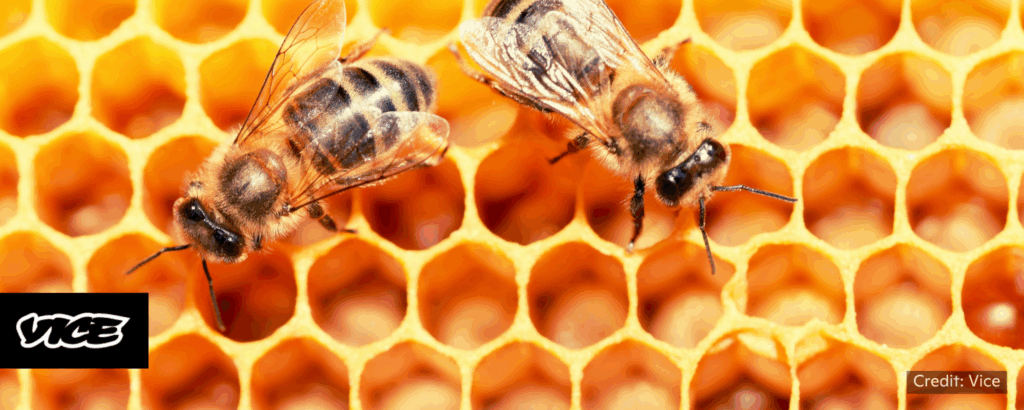 Scientists Say Bees Can Feel Happiness—and It’s Contagious
Scientists Say Bees Can Feel Happiness—and It’s Contagious
Luis Prada, VICE, 10/27/2025
“We like to think we humans are so special because we can express a range of emotions. It’s not that special, it turns out. Bees can not only feel happiness but also express it so well that their joy can spread to other bees.”
“In a study published in Science, a team of researchers discovered that good moods are contagious, even among insects with brains smaller than a sesame seed. Bumblebees can spread optimism . . . This phenomenon, known as ‘positive affective cognition,’ is a cornerstone of empathy in animals with more complex nervous systems. Until now, it hadn’t been seen in any invertebrates. Which means that your average garden bee might be a lot more emotionally tuned in than we ever gave it credit for.”
“The implications are significant. Emotional contagion may not be a luxury of large-brained creatures, but a fundamental feature of social life itself. Optimism might not just be an attitude, but a survival strategy that keeps us all going, no matter the species. That bee you see buzzing around the garden is just spreading pollen; it might just be spreading joy.” 📰 Full Story →
 We love dogs as family. We also experiment on them. Will it come to an end?
We love dogs as family. We also experiment on them. Will it come to an end?
Maria Bolotnikova, VOX, 11/2/2025
“Animal rights advocates often contrast humanity’s dismal treatment of animals farmed for food with our adoration bordering on worship of pet cats and dogs — the point being that these distinctions between animals that are equally sentient are arbitrary, hypocritical, and pointlessly cruel. The comparison makes an important point, but it also conceals a grimmer reality: Humans treat the animals that we categorize as beloved companions horribly, too, breeding millions of them in puppy mills and even experimenting on tens of thousands of them every year in labs.”
“Although ethical limits are sometimes framed as opposed to scientific progress, they are, in fact, constitutive of it. The slow unraveling of dog experimentation suggests that our better moral judgments can override institutional inertia — but it also shows how arbitrary the lines are that we draw between species, and how much further we have to go beyond the animals we’ve decided to love.” 📰 Full Story →
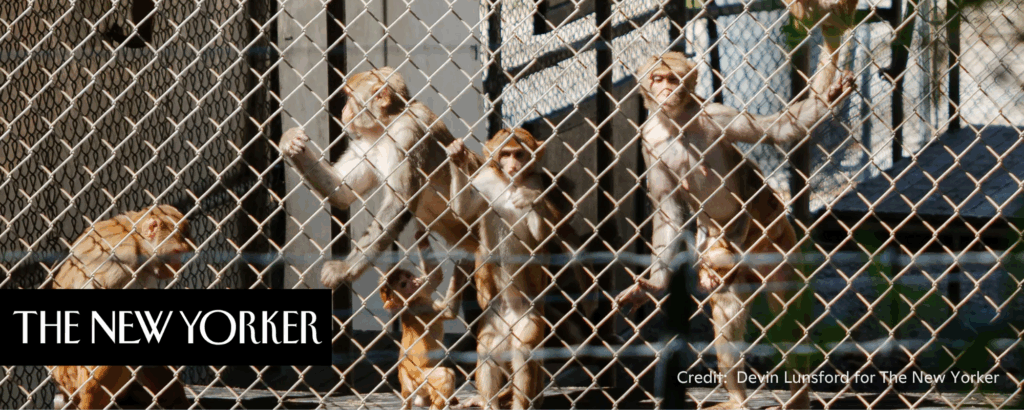 The Runaway Monkeys Upending The Animal Rights Movement
The Runaway Monkeys Upending The Animal Rights Movement
Ava Kofman, The New Yorker, 11/3/2025
Kathy Strickland, a veterinarian and former employee of Alpha Genesis “was surprised by how many of the problems she was treating were caused by staff negligence. When the maintenance team forgot to fix a heater, she would end up needing to amputate frostbitten fingers and tails. Or a water line would break, and no one would notice for hours, at which point monkeys would come to her dehydrated, with pinched skin and sunken eyes. Cages were old, and repairs often makeshift, so animals were always escaping—or injuring themselves trying to . . . The processing team, responsible for trapping and transporting monkeys, was known for causing some of the worst injuries,” including by “using metal nets to slam macaques on the ground . . . Often, when the monkeys saw the processing team’s van pull up, they screamed and got the runs—both a defense mechanism and a stress response. The chronic diarrhea could cause part of their intestines to fall out.”
“ . . . [Alpha Genesis] has been repeatedly cited by U.S.D.A. inspectors for escapes, insufficient food and water, processing injuries, and preventable deaths, but fined only once: a twelve-thousand-six-hundred-dollar penalty in 2017 . . . Deaths that drew no fine included an infant strangling itself with gauze, two animals whose fingers were stuck in the wiring of their enclosure, and a female with her head trapped in a chain-link fence and her body soaking wet, raising the possibility that someone had washed the cage without noticing she was dangling from it.”
“Throughout the year, [Alpha Genesis CEO Greg] Westergaard did not respond to my texts, calls, voice mails, or e-mails; when I visited his office to request an interview, security escorted me off the premises. Neither he nor his company responded to questions about animal-welfare violations and allegations of negligence.” 📰 Full Story →
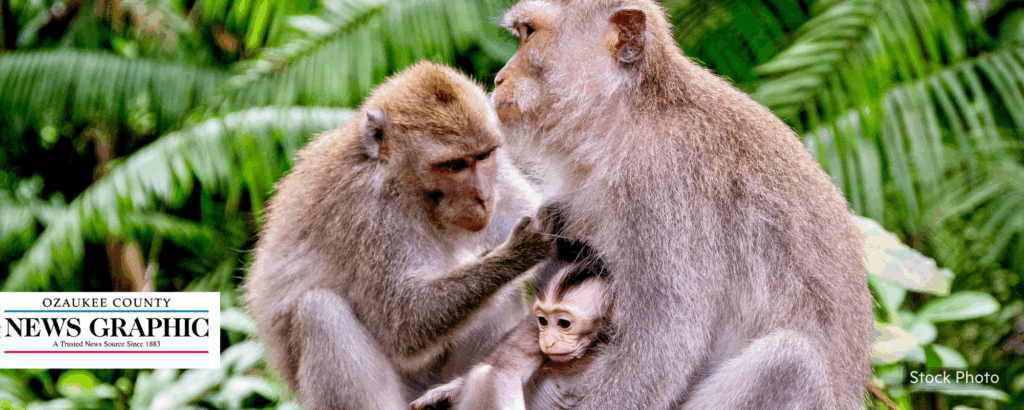 Mequon-Based Fromm Family Foods joins nationwide push for animal-free research
Mequon-Based Fromm Family Foods joins nationwide push for animal-free research
News Graphic Staff, Ozaukee County News Graphic, 11/4/2025
“Fromm Family Foods . . . has heeded PETA’s call to stop funding cruel experiments on animals at the University of Wisconsin-Madison Food Research Institute, according to a press release from PETA….”
“The Food Research Institute pays experimenters to conduct tests on animals related to food and food ingredients. It has funded experimenters who force-feed mice parasite-infested feces and force-feed pregnant monkeys listeria-contaminated whipping cream before cutting them open and dissecting the babies killed by the bacteria. They’ve also injected mice with bacteria that cause botulism and waited for them to die before dissecting them.”
“After hearing from PETA, the institute changed its sponsorship policy and created the ‘Food Research Institute Programmatic (Non-animal) Support Fund’ that lets sponsors divert their donations from animal testing, according to the press release. Fromm joins PepsiCo, Inc., Campbell Soup Company, and 18 other sponsors that have either directed their donations to the animal-free fund or cut off sponsorship entirely.” 📰 Full Story →
 The Unraveling of the New England Primate Research Center
The Unraveling of the New England Primate Research Center
Ella F. Niederhelman & Jack B. Reardon, The Harvard Crimson, 11/5/2025
“The [New England Primate Research Center] had faced repeated allegations of animal misconduct, beginning with a dead monkey left in a cage during a pressure washing in 2010. Over the next two years, three more monkeys died in incidents at the facility. The University, Harvard Medical School, and the center struggled to control a slow collapse. As the center’s legacy eroded and an asset for the university increasingly became a liability, [Harvard Medical School] discovered deep-seated mismanagement that had long endangered primates and the credibility of the center’s research.”
“ . . . on April 23, 2013, Harvard Medical School announced that it would be shutting down the facility, citing ‘constrained resources.’ . . . Preventable primate deaths had twice paused the center’s research, but its closure shocked primate researchers around the country and administrators at the National Institute of Health, who had funded the facility for nearly 50 years. The NIH was more than willing to fund the center for another five years, with NIH administrator John Harding telling the Boston Globe at the time that the closure was ‘Harvard’s decision, not ours.’ Costs were at the root of the NEPRC’s closure, but they were not purely financial.”
“All seven other national centers remain in operation today.” 📰 Full Story →
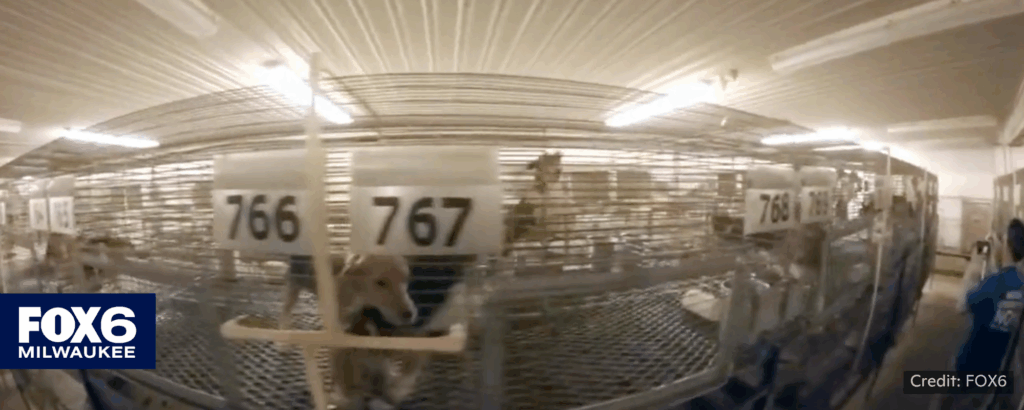 Ridglan Farms vet’s suspension upheld, disciplinary case continues
Ridglan Farms vet’s suspension upheld, disciplinary case continues
Bryan Polcyn & FOX6 News Digital Team, FOX6 News Milwaukee, 11/5/2025
“The veterinarian in charge of a controversial Wisconsin dog breeding farm will remain suspended – at least for now . . . A hearing Wednesday centered on Dr. Rick Van Domelen, the facility manager at Ridglan Farms. After a full day of testimony, Judge Angela Roy upheld the emergency suspension while his disciplinary case continues.”
“In September, the state’s Veterinary Examining Board suspended Van Domelen on an emergency basis. The board said he posed a danger to animals after he was found delegating painful cherry eye surgeries and dental extractions to unlicensed employees who failed to use proper anesthesia. A Ridglan Farms lawyer argued the dogs never felt any pain or distress.” 📰 Full Story →
 Cambridgeshire trial to spotlight MBR Acres beagle rescue
Cambridgeshire trial to spotlight MBR Acres beagle rescue
John Elworthy, cambsnews.co.uk, 11/6/2025
“Public outrage over animal testing has surged as the trial of 20 rescuers who removed 23 beagle puppies from MBR Acres approaches. The trial, set to begin on December 1, 2025, marks a pivotal moment in the ongoing campaign against the Cambridgeshire breeding facility.”
“The activists were arrested for suspected burglary and aggravated trespass. Twenty rescuers will appear in court across five separate trials scheduled through to March 2026 in relation to both the June and December rescues. If found guilty, they face potential sentences of up to ten years in prison.”
“The rescuers say they intend to ‘put animal testing on trial’ in a bid to expose the cruelty of the industry . . . ‘By spotlighting the cruelty of the animal testing industry in front of a jury of ordinary people, the industry will have nowhere to hide.’” 📰 Full Story →
In case you missed it:
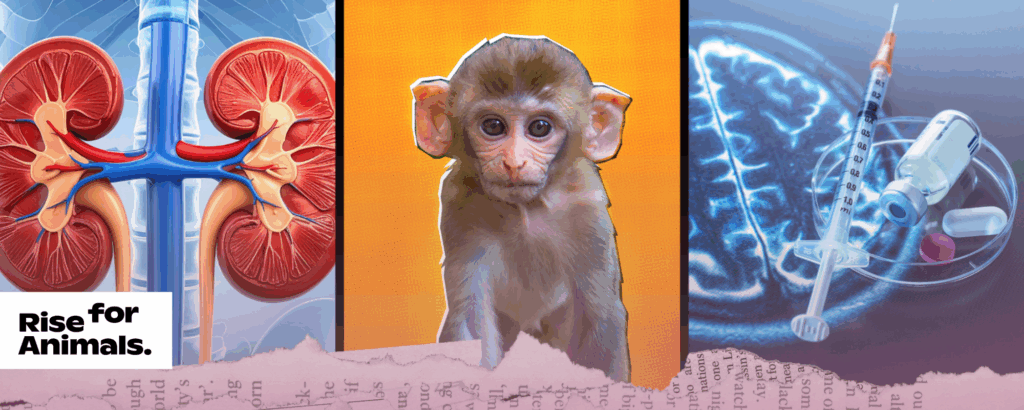 Non-Animal & Human-Relevant Research News: October 2025
Non-Animal & Human-Relevant Research News: October 2025
Rise for Animals, 11/3/2025
Explore the latest breakthroughs in human-relevant science from the last month, including miniature kidney, colon, and brain organoids; AI-driven therapeutics reducing animal testing; seaweed tissue scaffolds; and more. 📰 Full Roundup →
Share this news compilation on X or Bluesky.
Or copy, paste, and share this link on Facebook or anywhere else:
riseforanimals.org/news/news-nov-7-2025